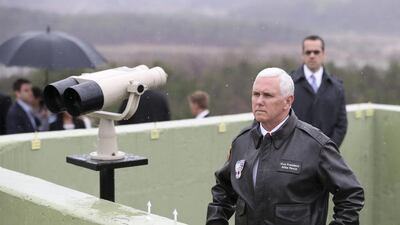PANMUNJOM, SOUTH KOREA // US vice president Mike Pence travelled to the tense zone dividing North and South Korea on Monday and warned Pyongyang “the era of strategic patience is over.”
The visit on Monday at the start of his 10-day trip to Asia was a US show of force that allowed the vice president to gaze at North Korean soldiers from afar and stare directly across a border marked by razor wire.
The vice president, wearing a brown bomber jacket, was briefed near the military demarcation line, two North Korean soldiers watched from a short distance, one taking multiple photographs of the American visitor.
Speaking near the Demilitarized Zone, Mr Pence said President Donald Trump was hopeful China would use its “extraordinary levers” to pressure the North to abandon its weapons programme, a day after the North’s failed missile test launch. But Mr Pence expressed impatience with the unwillingness of the regime to move towards ridding itself of nuclear weapons and ballistic missiles.
Pointing to the 25 years since the United States first confronted North Korea over its attempts to build nuclear weapons, the vice president said a period of patience had followed.
“But the era of strategic patience is over,” he declared. “President Trump has made it clear that the patience of the United States and our allies in this region has run out and we want to see change. We want to see North Korea abandon its reckless path of the development of nuclear weapons, and also its continual use and testing of ballistic missiles is unacceptable.”
In response, Pyongyang’s envoy to the United Nations, Kim In-ryong, said North Korea is ready to respond to “any mode of war” triggered by US military action.
In Moscow, foreign minister Sergey Lavrov said he hopes “there will be no unilateral actions like those we saw recently in Syria and that the US will follow the line that President Trump repeatedly voiced during the election campaign.”
Meanwhile, China made a plea for a return to negotiations. Foreign ministry spokesman Lu Kang said tensions need to be eased on the Korean Peninsula to bring the escalating dispute there to a peaceful resolution. he said Beijing wants to resume the multi-party negotiations that ended in stalemate in 2009 and suggested that US plans to deploy a missile defence system in South Korea were damaging its relations with China.
Later on Monday, Mr Pence reiterated that “all options are on the table” to deal with threat and said any use of nuclear weapons by Pyongyang would be met with “an overwhelming and effective response.” He said the American commitment to South Korea is “ironclad and immutable.”
He said Mr Trump’s recent military actions in Syria and Afghanistan meant “North Korea would do well not to test his resolve,” or the US armed forces in the region.
The vice president earlier visited a military installation near the DMZ, Camp Bonifas, for a briefing with military leaders at the joint US-South Korean installation. Under rainfall, Mr Pence later stood a few metres from the military demarcation line outside Freedom House, gazing at the North Korean soldiers across the border, and then peered at a deforested stretch of North Korea from a lookout post in the hillside.
In Tokyo, Japanese prime minister Shinzo Abe, said: “Needless to say, diplomatic effort is important to maintain peace. But dialogue for the sake of having dialogue is meaningless.”
“We need to apply pressure on North Korea so they seriously respond to a dialogue” with the international community, he said.
Mr Pence’s visit came amid increasing tensions and heated rhetoric on the Korean Peninsula. While the North did not conduct a nuclear test, the spectre of a potential test and an escalated US response has trailed Pence as he undertakes his Asian tour.
Mr Trump wrote on Sunday on Twitter that China was working with the United States on “the North Korea problem.”
* Associated Press

